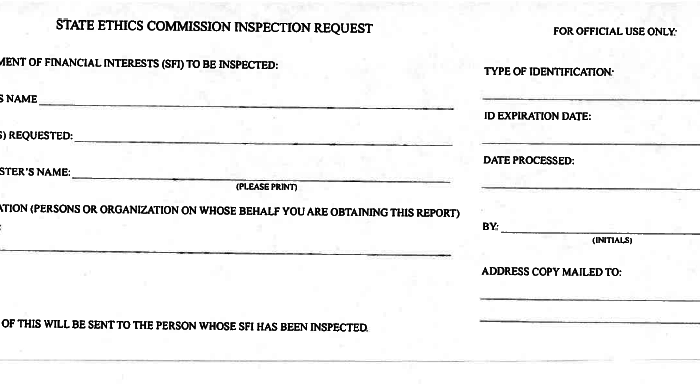When It Comes to Disclosing Public Official’s Financial Interests, Mass is in the Sad Minority
Last week, we looked at some of the bureaucratic obstacles that transparency advocates in Massachusetts can find themselves faced with, eventually singling out the Ethics Commission’s Statements of Financial Interests (SFIs) as a particularly egregious example. Not only does the Commission require you to fill out a completely superfluous additional form and attach a copy of your driver’s license (both flagrant violations of state public records law) but they then share this information with the individual you’re requesting information on – something utterly without precedent in public records, and really, intimidation by any other name. This week, we’ll see how this policy compares to SFIs in other states, and how it touches upon the larger issue of Mass’ commitment to opacity for opacity’s sake.
As we mentioned previously, the purpose of an SFI is to disclose in what ways a public official or a candidate has the opportunity to directly financial benefit from their position, and whether or not that might create potential conflicts of interest. If the person with the public responsibility for awarding sanitation contracts happens to own a sanitation company that also happens to keep winning all the contracts, that’s a pretty obvio us conflict of interest. While it’s rarely that straightforward, and usually it’s a brother-in-law or a cousin that owns the sanitation company – SFIs include the financial interests of extended families for exactly this reason – it’s fairly obvious that allowing easy access to these records is a good step towards ensuring that public servants are actually serving the public.
us conflict of interest. While it’s rarely that straightforward, and usually it’s a brother-in-law or a cousin that owns the sanitation company – SFIs include the financial interests of extended families for exactly this reason – it’s fairly obvious that allowing easy access to these records is a good step towards ensuring that public servants are actually serving the public.
Many states agree – most of them, in fact. Over half make their SFIs, or regional analog available through easily searchable online archives. Just a few hours north in Maine, their Ethics Commission offers a comprehensive list of the plethora of records available, complete with drop down menus and the option to export databases, making transparency just that less of a headache. The Way Life Should Be, indeed. Even my home state of Louisiana, which is not exactly regarded as a beacon of openness and accountability in government, offers a simple, effective system that puts ours to shame.
That said, there’s not much shame to be found – our State Ethics Commission homepage brags about the landmark laws that empower them to seek out and quash conflicts of interest wherever they can find them. Which apparently they see as their sole responsibility, as the tools for private citizens to hold their own officials accountable have been locked up by their purposely intractable policies.
Frustratingly, this is standard operating practice in Massachusetts – espousing the virtues of a n open government, sneering at the vices of states on the wrong side of transparency, and then getting in line right behind them when nobody’s looking. A couple weeks back, I wrote about the state’s participation in the justifiably controversial 1033 program, in which the Pentagon provided local law enforcement with military gear for only the cost of shipping and handling. MuckRock has since obtained the complete agency-by-agency transfer lists of 37 states. Of the remaining 13, five simply had no documents, and eight rejected the request entirely. Massachusetts is one of those shameful few, and holds on to that refusal as the list of complying state grows.
n open government, sneering at the vices of states on the wrong side of transparency, and then getting in line right behind them when nobody’s looking. A couple weeks back, I wrote about the state’s participation in the justifiably controversial 1033 program, in which the Pentagon provided local law enforcement with military gear for only the cost of shipping and handling. MuckRock has since obtained the complete agency-by-agency transfer lists of 37 states. Of the remaining 13, five simply had no documents, and eight rejected the request entirely. Massachusetts is one of those shameful few, and holds on to that refusal as the list of complying state grows.
States like New Jersey have long-establish histories of flouting public records requests and going out of their way to make government inaccessible. When New Jersey rejects a request for its 1033 data, that’s regrettable, but not surprising. When Massachusetts does it, it’s doing so as a state that prides itself on commitments to the public interest it does not keep. On the subject of transparency, Massachusetts is a hypocrite.
Which makes the fact that New Jersey posts its SFIs online all the more painful.
J. Patrick Brown is the Editor of Muckrock.com, an organization which facilitates public record requests and serves as an independent news source covering government transparency issues nationwide.



